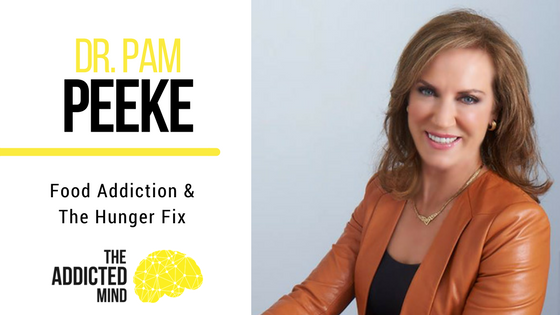On this episode of The Addicted Mind podcast, we are joined by Dr. Pam Peeke, a physician, and scientist specializing in food addiction. Those struggling with food addictions fit into two categories: (1) people who practice disordered eating which eventually takes over all other aspects of their life, or (2) those who are recovering from another addiction and have turned to junk food and beverages as a transfer addiction.
Disordered eating and food addictions mainly revolve around the chemical effects of processed foods on the brain’s reward center, which releases dopamine and conveys the feeling of pleasure to the body. When people continue to eat junk food, the reward center of the brain becomes overwhelmed and reduces the number of receptors that can process the dopamine being released, so eventually the feeling of pleasure attained by the release of a certain amount of dopamine doesn’t feel as good as it once did, which makes the person want to consume more junk food in order to reach the desired level of high. The food industry knows that processed but hyper-palatable food acts as a drug to the brain, impairing the frontal cortex which controls decision-making and discipline, so they try to create food that will make consumers feel that “bliss point” and crave even more junk food.
Dr. Peeke has worked with registered dieticians to outline a plan in her book “The Hunger Fix” (link below) to empower people to switch out processed food with natural and whole foods and allow the brain to shift back to a healthy balance of active receptors so that people can adjust to feeling a natural high from eating healthy. While the first step of recovery is to eliminate processed foods from home, work, and your shopping list, a crucial second step is to seek help from a registered dietician and/or support and accountability from family and friends to get back into a healthy balance. A key to the recovery process from food addiction is to understand why food has this power over the person, and Dr. Peeke has found that it normally stems from some type of childhood or adolescent trauma, where food was the only life situation that the person could control, so they seek pleasure and safe haven there.
A helpful exercise for someone wondering if they have a tendency toward food addiction is to honestly answer these two questions:
(1) If I consume this food/beverage, will I feel out of control?
(2) If I consume this food/beverage, will I feel shame, blame, or guilt?
If the answer to these questions is “yes”, you should take a step back and evaluate the foods you are eating and seek a change.
Connect with Dr. Peeke:
www.drpeeke.com
https://www.facebook.com/PamPeekeMD/
Purchase “The Hunger Fix”: https://www.amazon.com/Hunger-Fix-Three-Stage-Overeating-Addiction
If you or a loved one are struggling with an addiction, you are not alone. Check out our resources at www.theaddictedmind.com/help.

